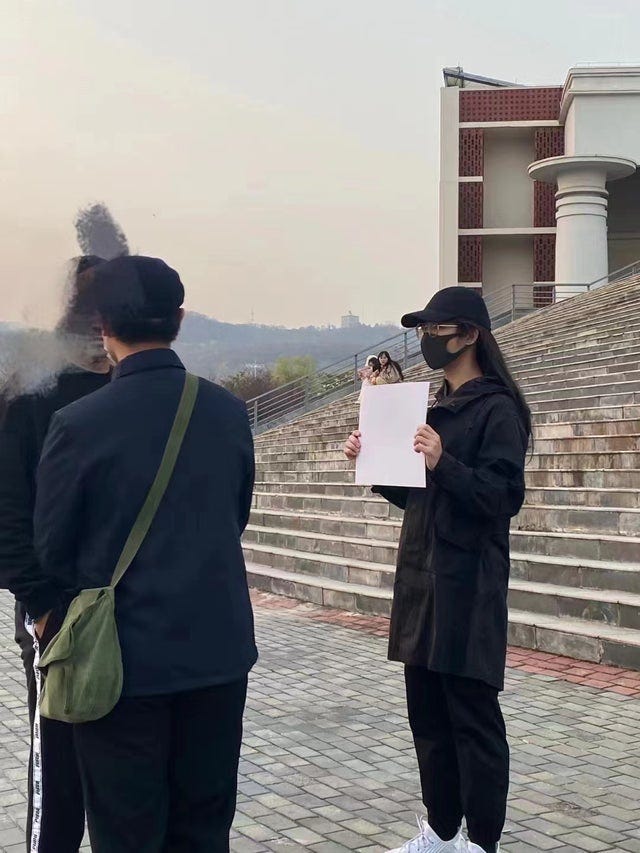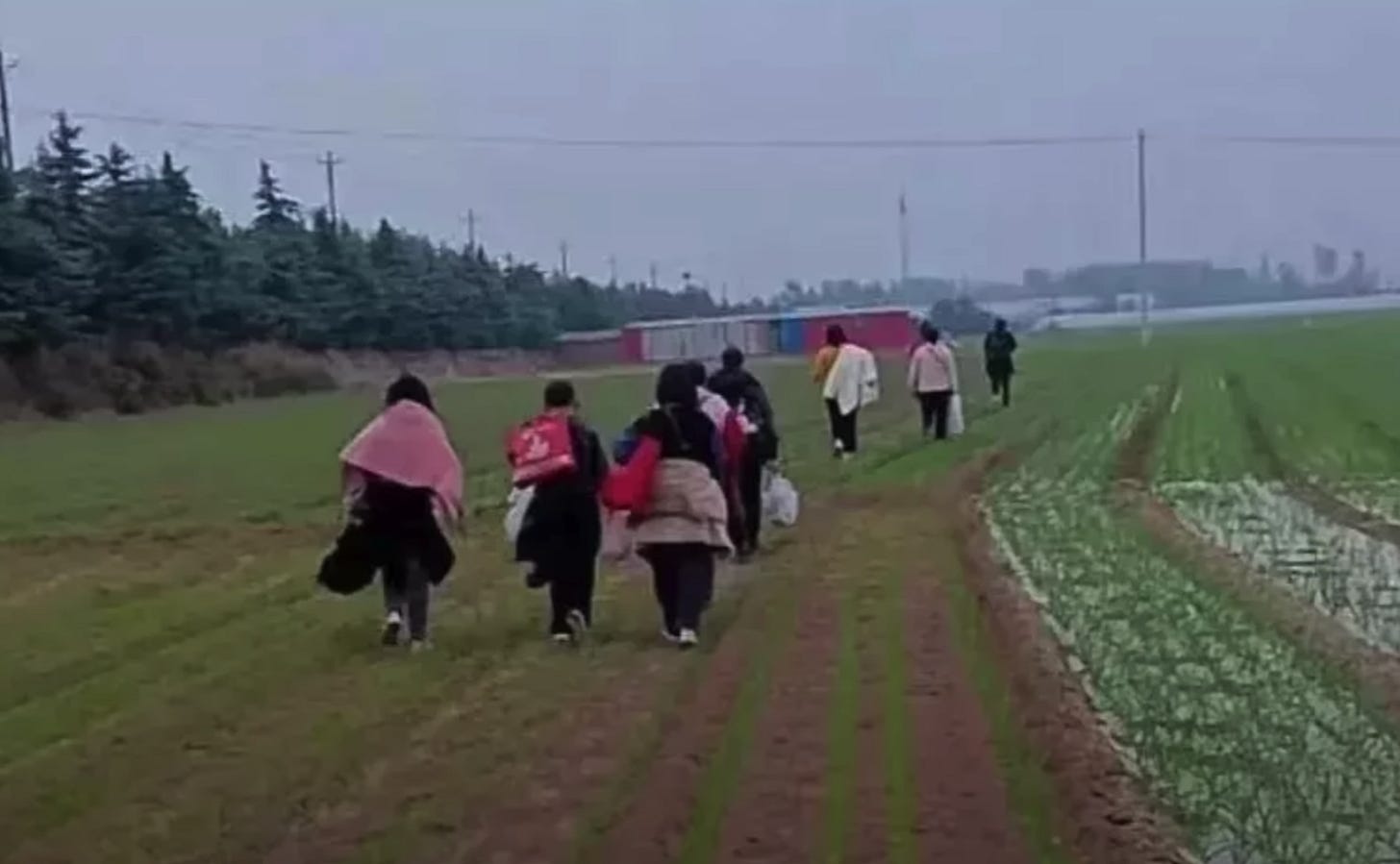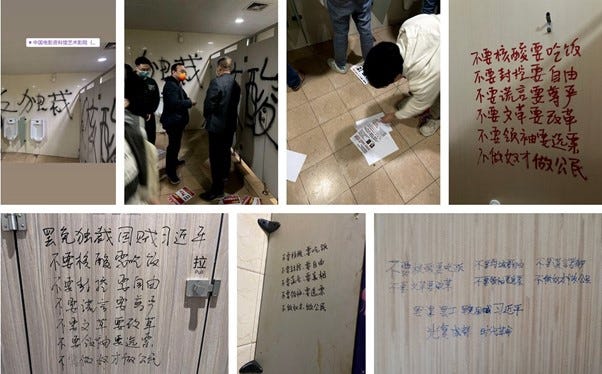China's Protests Mattered
"They underestimate the social consciousness of ordinary Chinese people. Given the right moment, they will speak their minds."
With the last ChinaTalk full edition of 2022, I wanted to revisit the most dramatic story of the year, the ‘White Paper Protests’ of November.
The following is a transcript of a YouTube video by Wang Zhi’an, a former CCTV journalist who now reports and comments from Japan, posted here with his permission. Uploaded on December 5, this video essay is an impassioned argument for the continued relevance of the A4 Revolution even after the Zero Covid policy has been rolled back.
In contrast to much of the Chinese-language coverage of the mainland on YouTube, I’ve found the work Wang Zhi’an has put out to be deeply thoughtful and informative, not to mention highly entertaining. His roast of Zhao Lijian after he froze up during COVID briefings and netizens got ahold of his wife’s weibo is the funniest thing I’ve seen all year. Even if you can’t speak Chinese, the English subtitles that google makes automatically are really impressive. Do consider checking out his channel.
ChinaTalk is a reader-supported publication. To receive new posts and support my work, consider becoming a free or paid subscriber!
Before we get to the transcript, I wanted to highlight these job postings primarily for investment professionals on the CHIPS Act implementation team.
Japan, Korea, and Taiwan have all learned the hard way that industrial policy needs talent at the tiller. If you think you can be part of the solution for US semiconductor manufacturing, do consider applying!
Resumes are due Dec 30.
The A4 Revolution will certainly have a place in future histories, so it's worth spending a day summarising this movement.
The first aspect: I would like to analyse why a week ago, such an enormous mass-gathering movement erupted in China and rallied around white paper as a slogan and symbol. I personally think there are two clues. The first clue is that the governments have driven the people to revolt because of the increasingly perverted pandemic prevention policy of the past six months. Ordinary people not only lost their freedom, but many of them also had no way to live. One of the most striking signs is that people committed suicide in many places of the country. Some of them couldn't survive any longer and jumped off buildings. Others committed suicide in fangcang — makeshift quarantine hospitals. I have seen many, many cases.
The other aspect is that many industrial workers played a very large role in this movement. The most striking feature is that it started at Foxconn. Foxconn is known as the symbol of Chinese manufacturing and the heart of the world's factories. It’s the world's largest assembly center for Apple Inc. There are hundreds of thousands of workers there. These people would not have resisted if there was any other way, because they are actually the lowest class in society and need money more than anyone else. But why did the workers in Foxconn eventually flee? If only pandemic measures didn't get perverted to such an extent, people at the bottom of society who needed money would never have fled [their workplace] in such an exaggerated way. They fled Foxconn on foot, walking dozens or even hundreds of kilometres. That scene shocked many people.
When I saw that scene, I knew [Zero Covid measures] had endangered the survival of the entire industrial workforce. This is the first scene.
Next was the struggle of Hubei people at the wholesale cloth market in Guangzhou's Haizhu district. In fact, their situation is somewhat similar to that of Foxconn.
They also live at the other end of the Made-in-China supply chain — the bottom of the industrial ecosystem. They are not likely to resist as long as they can survive.
However, because of lockdowns. they lost their only opportunity to make real money once a year — the Double 11 shopping festival. Eventually, things erupted: they pushed down barriers and knocked down fences. This is a very important reason. The police could not do anything.
Then there was the second revolt and riot at Foxconn in Zhengzhou. At that time, after the first wave of Foxconn workers fled, Zhengzhou’s city government and the Henan provincial government helped Foxconn recruit people from all over the country. As a result, more than 100,000 people were recruited at once. Afterwards, people were dissatisfied with sudden, frequent policy changes, and the [second] riot at Foxconn eventually broke out. This riot was the beginning of the national resistance movement. I think this riot had a very big impact.
Then the people of Urumqi protested on the streets. We all know that Urumqi is the city that had been locked down for the longest time in the country — over 100 days. So the feeling of the people there are likely at a different level than that of the people in other cities. Look at the slogans chanted in front of Urumqi City Hall:
[Editor’s note: the building was, in fact, the official building of the 12th Brigade of the Xinjiang Production and Construction Corps (XPCC), the region's de facto administrative body.]
If we’re all going to die, let’s die together! Are you afraid of Covid?
When you hear slogans like this, you know that the people of Urumqi had had their tolerance pushed to the limits.
Of course, another objective factor at play here is the fire that killed ten in Urumqi at the same time. The entire country’s emotions accumulated together. At that time, there was an article called "Ten Questions" [spreading] on WeChat Moments. The article wasn’t actually all that well-written, so why did it go viral on WeChat Moments overnight? Because this incident in Urumqi touched the emotions of everyone in the country.
In my opinion, this is what we call 官逼民反: a government driving its people to revolt. The government’s unreasonable policies eventually extinguished the last hope of survival for ordinary people, so they had to rebel against it. This is a very important clue.
The other clue is actually one of expression. From the past month or two, the people of China have not simply been pleading for help. Some elements of resistance had already been emerging. Not only are there factors for resistance, there were also expressions of resistance. These expressions and factors were filmed and affected many people. I think one of the most important figures [among these episodes] was the Chongqing speech man. This was him at the entrance of a neighborhood:
… in exchange for freedom and the same busy streets as they now have in Hong Kong! … What are you all laughing at? You're all just lapdogs. … Carrots now cost eight yuan ($1.15) for half a kilo! How much should half a kilo of carrots cost? I want to know how much half a kilo of normal carrots should cost! …
He talked about how during lockdown, prices (of vegetables) doubled or quadrupled. He spoke of how hard it was for folks living paycheck-to-paycheck to survive under this epidemic-control policy.
“Those people” are spending 16.9 yuan ($2.42) per half-kilo on carrots. Have you thought about that? What kind of happiness do they want?
I tell you there is only one disease in this world: it's called unfreedom and poverty, and we have both of them now. We're still struggling with a little flu! Why? I'll tell you the most straightforward reason: because the city government has been proven wrong and they can only continue being wrong. … If they admit they are wrong, they’ll have to take responsibility.
And then finally he roared: give me liberty, or give me death.
There was a text that was once in our textbooks. There were six words in it: “Give me liberty, or give me death!”
Many people say that we Chinese are not good at expression. In fact, it is not the nature of Chinese people to be inexpressive. Rather, our system does not necessitate expression. Look across the strait at Taiwan: generally speaking, politicians there speak eloquently in front of the camera and to ordinary people. Why? Because a very important prerequisite for a democratic system is that if you want to participate in politics, you have to learn to express yourself in front of the public. In other words, in a system where public issues are open to discussion in public, the ability to give speeches is an essential quality and will be cultivated.
But China has not had such an institutional design for a long time. Politicians themselves do not need it; they don't need to win the support of the people. There is also no need for public mobilization with regards to other public issues. I think the speech of the Chongqing superman really did become a very important process of public mobilization during the whole event. The people around him applauded! And later when the police came and arrested him, people went to rescue him and eventually got him out of the police’s hands.
It could be said that the “Chongqing superman” created a prelude that resembled the A4 Revolution: there was a whole process of protest, expression, police repression, and finally a face-to-face confrontation with the police and victory.
Since everyone has a smartphone now, the whole process — whether it's the process of resistance or the process of expression — was filmed on mobile phones and posted on the internet. These images inspired many people. When Foxconn workers went to revolt, many marched forward holding phones in their hands and singing songs. I thought that scene looked like a blockbuster movie. Watching the scene itself came to constitute social mobilisation. It showed a lot of people that these dabai, who were usually so insufferably arrogant, were not as powerful as they thought. Why? Because they're not on the side of justice. They are cowards at heart. When they really need to suppress these people, they also have an internal moral struggle.
“The people's police” are for the people; how are they for the people? They are repressing the people!
Whose children are you? And whose fathers are you? Don't your consciences hurt? How many people died today? Doesn't your conscience hurt?
So I personally feel that these expressions themselves had become social mobilisation in the run-up to the A4 Revolution. It is because these two factors came together that a third factor eventually arrived, which was Twitter. Chinese Twitter played a unique role during the A4 Revolution. As we all know, Chinese Twitter used to be isolated from information in China. I don't mean that there is a firewall. Rather, information discussed on the two platforms did not overlap before. People on Chinese Twitter were mostly passionate anti-communists. As for the plight of the people in the country or details on what was going on, they didn't really care that much. Even when there was some information, it was fragmented, splintered, or taken out of context.
But it is different for this time. Masses of people, who had no way of broadcasting or distributing the footage they filmed in the country, ended up posting information on Twitter. Twitter, then, became the heart of mass mobilisation during the protest. The power of this mobilisation has become unprecedentedly large. For example, some people in China say that there are “sabotage and infiltration activities” by foreign hostile forces within the A4 Revolution. I think this makes a certain kind of sense. Why? If it were not for Chinese Twitter’s massive mobilisation and widespread gathering of information, I don’t think the “blank-paper” protests could have surged widely with such momentum. So Chinese Twitter is a kind of “hostile foreign force.”
You have to pay attention to what [the movement] sees as its enemy. I personally don't think it’s against the ordinary people of China. Instead, it sees those unreasonable and perverted Covid measures as the enemy. It targeted those who do not act in the interests of the common people; dictators who have no regard for the entire country’s public interest. I think this time, Twitter’s power of mobilisation is similar to that of Sina Weibo in the past. This is a truly significant change that I will explore later on. Overall, the impact is far-reaching.
I think that mainly stemming from these three factors, we first saw a female student at Nanjing’s Communications University hold up a piece of blank paper, which spread quickly across the country. A single spark can start a blaze. From Nanjing to Shanghai, Beijing, Chengdu, Wuhan and Hangzhou, the entire vast and torrential A4 Revolution lasted for about a week.

The reason why the A4 Revolution happened is the first aspect. The second aspect is about the purpose of the movement. Somebody asked me, “Are the protestors successful?” I personally feel that the movement has been successful. There are two criteria for evaluating this.
The first is: what is the most direct demand of the mass demonstrations? It is to get rid of unreasonable Covid measures. This is the most important consensus among all the A4 Revolution participants across the country.
Everyone knows that in the past few days, governments in all parts of the country have actually lifted most of the Covid measures. The policy experienced a sharp U-turn, though the Communist Party is unwilling to admit it. They deny any causal relationship between the resistance and policies. But everyone actually understands that there must be a relationship. If there were no mass gatherings and if people didn’t shout political slogans in the protests, I think that even if the Communist Party eventually lifted all the Covid measures, it would not have been this fast and would not have taken the form of a U-turn.
Therefore, it should be said that the A4 Revolution fought for ordinary Chinese people’s most basic right: the right to say no to unreasonable Covid measures. This is also unprecedented. The Communist Party’s underlying logic is this: the more you fight, the less you get. This was what happened when Hong Kongers fought for universal suffrage: the more you fought, the less willing they were to concede. They’re happy to toss out a few rewards if you’re compliant, but if you fight them, they will punish you. This is the logic of the Communist Party because it wants slaves, not citizens.
But not this time: the outrage and anger of ordinary people, mobilised during all these protests, show that the extent of grievances is unparalleled. In the end, the Party conceded. This is quite rare. In the ruling history of the Communist Party, there are extremely few occasions where they finally made concessions in the face of mass protest. This is the first criterion. Therefore, I think the A4 Revolution actually succeeded.
Another criterion is that everyone knows that it has been more than 30 years since 1989. There has never been a large-scale mass demonstration in China since then that’s centered around political expression and public interests. I personally think this is the first time. There are have been many incidents of mass gatherings, but those all tended to center around people defending their own interests: demanding fair compensation when homes are forcibly demolished, opposing potential nuclear power plants near villages… Across the country over the years, there have always been protests. However, this is the first time in decades where there have been mass gatherings for the public interest. That's a break from history.
You have to think about the fact that the widespread demonstrations did not end in a violent crackdown. In the end, it wrapped up in a kind of whimper. However, the fact that the ending was inconclusive is actually a fantastic victory for the protestors. The Communist Party did not disperse or arrest these people through violent means. Police in Shanghai arrested some people and released them soon after. Beijing barely arrested anyone. There were some arrests in other cities, and they were mostly released afterwards.
This also shows that in fact, ordinary people in China have fought successfully in a reverse manner for the right to public political expression. It’s amazing, because the right became extinct after 1989 and had not been exercised at all until now. Of course, I don't think that the comparison between this demonstration and the 1989 movement is fair.
I think the story of 1989 belongs to the previous generation. The social problems in China suggest that we should reconstruct our logic for social change. There is no need to compare everything with 1989.
If you look carefully at the movement in 1989, the appeals and slogans put forward were relatively abstract. It’s very different now. Today's Chinese people, after 30 years of reform and opening up, are also growing up. I personally feel that civil dissenters in China no longer need to build strong connections with 1989. In fact, throughout this particular social movement, the 1989 generation had very little impact. Look at those ‘89 intellectuals in exile abroad: did they build any connections with the A4 Revolution folks? Did they participate? No. That’s why I personally think that the A4 Revolution can build its own framework. It doesn’t relate to 1989 and it doesn’t need to be compared to it. In time, in its own way, if people can still make their voices heard, then the impacts of these kinds of protests on shaping social change in China cannot be underestimated.
The third aspect is my predictions for the future. First, the CCP will definitely tighten its control over the Internet. I had talked earlier about how the hub of mobilisation and information-sharing was Twitter — and also YouTube. It is precisely because ordinary people were able to scale the Great Firewall and browse YouTube and Twitter that they could come together and find themselves in the same place. The most obvious evidence is Peng Zaizhou’s slogan. The phrases that everyone shouted when gathering in almost every city across the country were"Yes to freedom, no to Covid tests" and "Yes to votes, no to dictatorship". This slogan was first hung up on Sitong Bridge. Think about it: no media in China reported on the banner incident. So how did people from all over the country shout the same slogans when they gathered spontaneously? Because they all saw this on Twitter. So, Twitter became Chinese protesters’ mobilising hub.
Thus the CCP must find a way to remove such a platform from China. The CCP can't control Twitter, but it can control Chinese people’s internet usage. Lately, you can see that controls over VPNs have been tightened gradually. That is the next step for the CCP going forward. They must do everything they can to cut off the influence of Twitter in mainland territories, as well as other overseas platforms such as YouTube, in order to stop the influence of Western social media on domestic political activities and social movements. This is the first point.
The second point is that I don’t think they will deal with those protesters who gathered last week too forcefully. You can see that a group of people were arrested in Shanghai the first night. But by the second day, they were basically all released. Very few were arrested in Beijing. Many people from other cities, such as Chengdu and Wuhan sent emails to me saying that the parents of people who protested last week received calls from the police in the days following the unrest. I don't find this surprising. Considering the CCP’s current power and extent of control over society, it is not difficult for them to find out who participated in the events. But I think that in most cases generally, the police will only summon protesters involved for chats and admonitions — in other words, verbal intimidation. Why is this the case? They are many reasons. One is that the Covid measures in the past were indeed unpopular, and even many people within the government did not agree. In fact, some within the system were likely privately supportive of these young people taking to the streets to protest, leading to a change in policy.
They don't think it's unreasonable for these people to take to the streets, since the reason for their actions is justified. The problem is that within the system, there are no normal mechanisms for them to express policy opinions freely either. So, when these ordinary people gathered in the streets and shouted those slogans, some officials were listening with a sense of relief and empathy. They also didn’t want severe Covid measures. That’s why those in the government won’t punish them harshly.
The third aspect is the future of social movements in China. Blank paper will become a very prominent symbol in mobilising masses. Though the protests didn’t last long this time, social movements in China will definitely not stop here. Considering China’s development, as long as this system does not change, conflicts and divisions in society will continue to express themselves in the form of social movements. When another mass movement occurs, blank paper will surely become the symbol and banner of any demonstration.
Folks, don't underestimate this piece of blank paper. Although there is nothing written on it, it can make tyrants tremble.

It can also inspire courage in those who are helpless in the face of a tyrannical machine. This is the power of mobilising during a movement. During countless social movements, street movements, and even street revolutions in the past, most ordinary participants were not particularly courageous people in daily life. But when a mass movement surges under an inspiring flag, they have nothing to fear. What is this flag in China now? It is a blank sheet of paper. This blank sheet of paper is destined to go down in history. It will play a greater role in future Chinese social movements.
I think the future of our nation is promising. After the A4 Revolution, I think that ordinary people in China are not like what many people expect. They think these common folks are ignorant and cowardly, and that they don't know how to fight. They think that if you just toss ordinary Chinese people a bone, they will forget all about their past suffering. It’s not like that.
They underestimate the social consciousness of ordinary Chinese people. Given the right moment, they will speak their minds. They can even come together calmly and rationally to express normal social needs.
It is the mighty force of healthy rationality that makes dictators fear the most, is it not?
Watch the video here:




The timing is also critical. Protests took place at the time when the economy is losing momentum.
China has had many protests led by heroic students and workers. But the country will never be able to achieve the aims of the May Fourth enlightenment -- to adopt science and democracy and join the modern world -- until tens and hundreds of millions of China's prisoner subjects abandon all illusions in their so-called government and take to the streets to overthrow the feudal fascist Stalinist CCP.